Local
March on Washington speakers – gay and straight – call for LGBT equality
Martin Luther King III, NAACP head, U.S. Attorney General mention gays in speeches
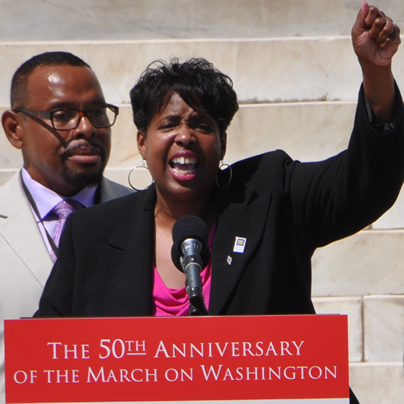
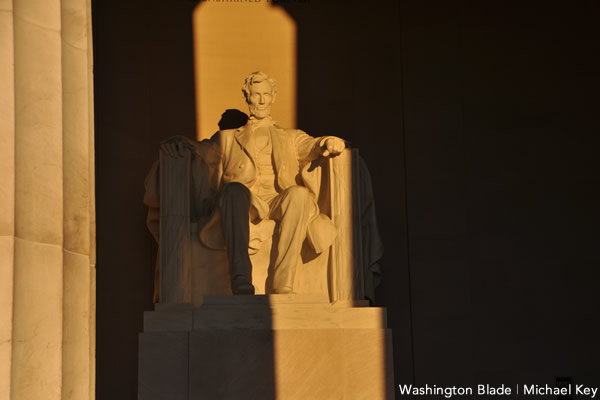
The Lincoln Memorial, site of the 50th Anniversary of the 1963 March on Washington, where Dr. Martin Luther King, Jr. originally gave his famous ‘I Have a Dream’ speech. Five gay and lesbian speakers were among those who took the podium on Saturday. (Washington Blade photo by Michael Key)
At least a dozen civil rights leaders and public officials speaking at the Lincoln Memorial on Saturday to commemorate the 50th anniversary of the 1963 March on Washington joined five gay and lesbian speakers in embracing LGBT equality.
Martin Luther King III, one of the lead organizers of the 50th Anniversary March on Washington; U.S. Attorney General Eric Holder; U.S. House Minority Leader Nancy Pelosi (D-Calif.); NAACP President and CEO Benjamin Jealous; and Leadership Conference on Civil Rights President Wade Henderson were among those expressing the theme that LGBT rights are part of the boarder civil rights movement.
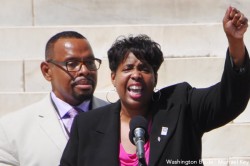
HRC Associate Director of Field Outreach Donna Payne was one of the LGBT speakers at the March on Washington. (Washington Blade photo by Michael Key)
With tens of thousands of people assembled before her on the Lincoln Memorial steps and the National Mall, lesbian activist Donna Payne expanded on that theme.
“In times like this today I stand proudly with you as an African American lesbian representing the Human Rights Campaign,” Payne told the gathering. “I am proud because the lesbian, gay, bisexual, and transgender community and the African American community are working together toward justice for all.”
Payne added, “There have been many attempts to tell you that we can’t get along because we are so different. Don’t believe that hype. I come from a mother and father that sat at the tables at Woolworth stores fighting for freedom from Jim Crow laws.”
Payne, HRC Associate Director of Field Outreach, was referring to black civil rights activists who staged sit-in protests in the early 1960s at segregated restaurants and other businesses in the South that restricted blacks to “colored only” areas.
“The majority in my family are lifetime members of the NAACP,” she said. “This commitment doesn’t stop because I’m a lesbian. I am part of the fabric that weaves our destiny together,” she said. “Freedom is not about one civil rights group but it’s about all of our civil rights for everyone.”
A second rally at the Lincoln Memorial on Wednesday, Aug. 28, in connection with the 50th Anniversary March on Washington events, was scheduled to include speeches by Presidents Barack Obama, Bill Clinton, and Jimmy Carter. Also scheduled to speak was lesbian activist Eliza Byard, executive director of the Gay, Lesbian & Straight Education Network (GLSEN).
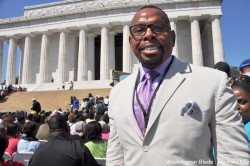
HRC director of Faith Partnership and Mobilization Rev. MacArthur Flournoy (Washington Blade photo by Michael Key)
Rev. MacArthur Flournoy, HRC director of Faith Partnership and Mobilization, told the Lincoln Memorial rally that LGBT people are also part of the faith-based arm of the civil rights movement.
“Today I stand up as a black gay man ordained in the church in love with God filled with faith,” he said. “So we at the Human Rights Campaign – we join our faith with your faith. We look for an end to discrimination in all its forms. No more religious bigotry. No more racist bigotry. No more violence bigotry.”
Sharon Lettman-Hicks, executive director of the National Black Justice Coalition, an LGBT rights organization, and Payne of HRC were added as speakers at Saturday’s Lincoln Memorial event after the initial list of speakers had been released.
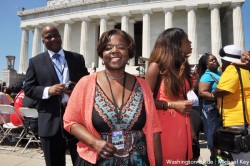
Executive Director of the National Black Justice Coalition Sharon Lettman-Hicks (Washington Blade photo by Michael Key)
“Every day I educate, advocate, and celebrate the contributions of the black lesbian, gay, bisexual, and transgender community because if any of my brothers and sisters are not equal and free none of us are truly equal and free,” said Lettman-Hicks, a straight, longtime advocate for LGBT rights.
Lettman-Hicks was among a number of the rally speakers who talked about Bayard Rustin, a gay man who served as one of the lead organizers of the 1963 March on Washington and one of Martin Luther King Jr.’s top advisors.
“Rustin was a radical visionary, a black gay activist for freedom and justice during a time when the conditions of both of these identities were perilous,” she said. “Rustin was as unapologetically black as he was gay and by his very presence challenged the evils of homophobia and racism throughout his life.”
Adrian Shanker, president of the statewide LGBT rights group Equality Pennsylvania, identified himself as a “gay Pennsylvanian reflecting on the historic march 50 years ago, a march organized by another gay Pennsylvanian named Bayard Rustin.”
Shanker said he was proud to speak at an event with distinguished civil rights leaders “who paved the paths that allow us to stand here today more equal than yesterday, but with so much farther to go before the dream Dr. King shared will be realized.”
He noted that in Pennsylvania LGBT people can still be fired from their jobs because of their sexual orientation or gender identity. In his home state the governor recently signed a voter ID law “intended to suppress our votes,” and LGBT youth face school bullying “every day,” he said.
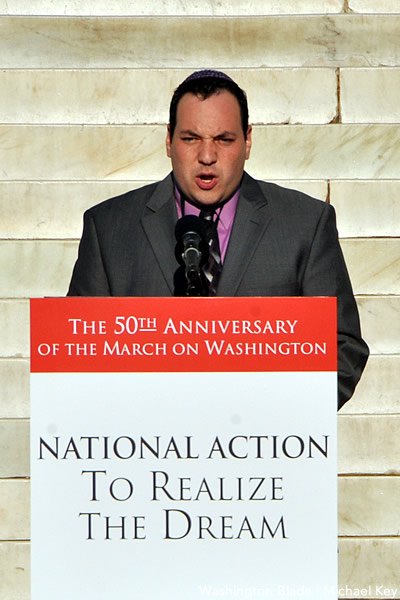
Adrian Shanker, president of Equality Pennsylvania (Washington Blade photo by Michael Key)
“In Pennsylvania my legal marriage to my husband Brandon is not recognized by my government,” said Shanker, who called on states and the U.S. Congress to pass laws to eliminate the remaining discriminatory practices faced by LGBT people across the country.
Two out lesbians and LGBT rights advocates that spoke at the Lincoln Memorial rally – Randi Weingarten, president of the American Federation of Teachers; and Mary Kay Henry, president of the Service Employees International Union (SEIU), stressed the importance of organized labor in the U.S. civil rights movement.
“Dr. King’s oration 50 years ago helped us create a better world, although we do not yet have the world that Dr. King dreamed of,” Weingarten said. “So this must not be a commemoration. This must be a continuation of that righteous fight to achieve racial and economic opportunity at the voting booth, in our schools, in our workplaces and in our communities.”
She added, “Fifty years ago another gay person, Bayard Rustin, had to be in the shadows. But today, I speak as a teacher, a worker, a labor activist and a gay person deeply committed to my faith…This is who we must be, not only a country that believes in equality but a country that acts on that belief. So let’s take a lesson from King. Let’s unite…”
Henry didn’t specifically mention LGBT rights but called for the broad civil rights and economic opportunities that she said were the hallmark of Martin Luther King Jr.’s advocacy work.
“As we rededicate ourselves to the goals of the 1963 marchers imagined 50 years ago we stand for freedom,” she said. We stand for jobs. We stand for equality. And the visionaries of this march proclaimed that we were going to fight the twin evils of racism and economic inequality.”
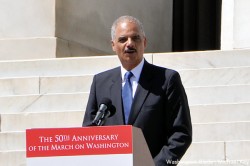
U.S. Attorney General Eric Holder (Washington Blade photo by Michael Key)
Holder, like many of the non-LGBT speakers, noted that LGBT people and other minorities have become a part of the mainline civil rights movement since the time of the 1963 march.
“As we gather today, 50 years later, their march – now our march – goes on,” Holder told the rally at the Lincoln Memorial. “And our focus has broadened to include the cause of women, Latinos, of Asian Americans, of lesbians, of gays, of people with disabilities, and of countless others across the country who still yearn for equality, opportunity, and fair treatment.”
Martin Luther King III said the civil rights movement has become stronger as it has become broader and more diverse, with the diversity reflected in different minorities and different faiths.
“Yes, we all need to love each other, black and white, old and young, red and brown, gay and straight, Christian, Muslim and Jew and all of God’s children loving one another,” he told the rally.
Jealous of the NAACP gave a fiery speech challenging opponents of various civil rights efforts in the country, including opponents of immigration rights and marriage equality.
“When they say no, you can’t have the Dream Act, no you can’t have marriage equality, no you can’t abolish the death penalty, no you can’t expand voting rights in any state south of the Mason-Dixon, we say – yes we can!” shouted Jealous to loud applause and cheers from the crowd.
Newark, N.J., Mayor Cory Booker, who is running for a seat in the U.S. Senate, also sounded the theme of LGBT equality being part of the broader civil rights movement.
“We must stand until we live in a nation where it doesn’t matter who you love and we don’t have second class citizenship for our gay and lesbian brothers and sisters,” he said.
Rep. John Lewis (D-Ga.) was a student in his early 20s when he joined Martin Luther King Jr. and other civil rights icons in non-violent civil disobedience protests in the 1960s. He’s the last living speaker from the 1963 March on Washington.
In his remarks at Saturday’s 50th Anniversary March at the Lincoln Memorial, Lewis expressed support for LGBT equality, just as he has during his years as a congressman.
“It doesn’t matter if we are straight or gay,” he said. “We are all one people.”
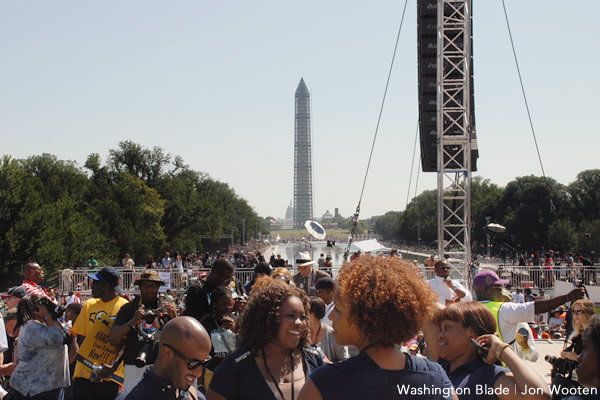
National March on Washington (Washington Blade photo by Jon Wooten)
District of Columbia
Judge rescinds order against activist in Capital Pride lawsuit
Darren Pasha accused of stalking organization staff, board members, volunteers

A D.C. Superior Court judge on Feb.18 agreed to rescind his earlier ruling declaring local gay activist Darren Pasha in default for failing to attend a virtual court hearing regarding an anti-stalking lawsuit brought against him by the Capital Pride Alliance, the group that organizes D.C.’s annual Pride events.
The Capital Pride lawsuit, initially filed on Oct. 27, 2025, accuses Pasha of engaging in a year-long “course of conduct” of “harassment, intimidation, threats, manipulation, and coercive behavior” targeting Capital Pride staff, board members, and volunteers.
In his own court filings without retaining an attorney, Pasha has strongly denied the stalking related allegations against him, saying “no credible or admissible evidence has been provided” to show he engaged in any wrongdoing.
Judge Robert D. Okum nevertheless on Feb. 6 approved a temporary stay-away order requiring Pasha to stay at least 100 feet away from Capital Pride’s staff, volunteers, and board members until the time of a follow-up court hearing scheduled for April 17. He reduced the stay-away distance from 200 yards as requested by Capital Pride.
In his two-page order issued on Feb. 18, Okun stated that Pasha explained that he was involved in a scooter accident in which he was injured and his phone was damaged, preventing him from joining the Feb. 6 court hearing.
“Therefore, the court finds there is a good cause for vacating the default,” Okun states in his order.
At the time he initially approved the default order at the Feb. 6 hearing that Pasha didn’t attend, Okun scheduled an April 17 ex parte proof hearing in which Capital Pride could have requested a ruling in its favor seeking a permanent anti-stalking order against Pasha.
In his Feb. 18 ruling rescinding the default order Okun changed the April 17 ex parte proof hearing to an initial scheduling conference hearing in which a decision on the outcome of the case is not likely to happen.
In addition, he agreed to consider Pasha’s call for a jury trial and gave Capital Pride 14 days to contest that request. The Capital Pride lawsuit initially called for a non-jury trial by judge.
One request by Pasha that Okum denied was a call for him to order Capital Pride to stop its staff or volunteers from posting information about the lawsuit on social media. Pasha has said the D.C.-based online blog called DC Homos, which Pasha claims is operated by someone associated with Capital Pride, has been posting articles portraying him in a negative light and subjecting him to highly negative publicity.
“The defendant has not set forth a sufficient basis for the court to restrict the plaintiff’s social media postings, and the court therefore will deny the defendant’s request in his social media praecipe,” Okun states in his order.
A praecipe is a formal written document requesting action by a court.
Pasha called the order a positive development in his favor. He said he plans to file another motion with more information about what he calls the unfair and defamatory reports about him related to the lawsuit by DC Homos, with a call for the judge to reverse his decision not to order Capital Pride to stop social media postings about the lawsuit.
Pasha points to a video interview on the LGBTQ Team Rayceen broadcast, a link to which he sent to the Washington Blade, in which DC Homos operator Jose Romero acknowledged his association with Capital Pride Alliance.
Capital Pride Executive Director Ryan Bos didn’t immediately respond to a message from the Blade asking whether Romero was a volunteer or employee with Capital Pride.
Pasha also said he believes the latest order has the effect of rescinding the temporary stay away order against him approved by Okun in his earlier ruling, even though Okun makes no mention of the stay away order in his latest ruling. Capital Pride attorney Nick Harrison told the Blade the stay away order “remains in full force and effect.”
Harrison said Capital Pride has no further comment on the lawsuit.
District of Columbia
Trans activists arrested outside HHS headquarters in D.C.
Protesters demonstrated directive against gender-affirming care

Authorities on Tuesday arrested 24 activists outside the U.S. Department of Health and Human Services headquarters in D.C.
The Gender Liberation Movement, a national organization that uses direct action, media engagement, and policy advocacy to defend bodily autonomy and self-determination, organized the protest in which more than 50 activists participated. Organizers said the action was a response to changes in federal policy mandated by Executive Order 14187, titled “Protecting Children from Chemical and Surgical Mutilation.”
The order directs federal agencies and programs to work toward “significantly limiting youth access to gender-affirming care nationwide,” according to KFF, a nonpartisan, nonprofit organization that provides independent, fact-based information on national health issues. The executive order also includes claims about gender-affirming care and transgender youth that critics have described as misinformation.
Members of ACT UP NY and ACT UP Pittsburgh also participated in the demonstration, which took place on the final day of the public comment period for proposed federal rules that would restrict access to gender-affirming care.
Demonstrators blocked the building’s main entrance, holding a banner reading “HANDS OFF OUR ‘MONES,” while chanting, “HHS—RFK—TRANS YOUTH ARE NO DEBATE” and “NO HATE—NO FEAR—TRANS YOUTH ARE WELCOME HERE.”
“We want trans youth and their loving families to know that we see them, we cherish them, and we won’t let these attacks go on without a fight,” said GLM co-founder Raquel Willis. “We also want all Americans to understand that Trump, RFK, and their HHS won’t stop at trying to block care for trans youth — they’re coming for trans adults, for those who need treatment from insulin to SSRIs, and all those already failed by a broken health insurance system.”
“It is shameful and intentional that this administration is pitting communities against one another by weaponizing Medicaid funding to strip care from trans youth. This has nothing to do with protecting health and everything to do with political distraction,” added GLM co-founder Eliel Cruz. “They are targeting young people to deflect from their failure to deliver for working families across the country. Instead of restricting care, we should be expanding it. Healthcare is a human right, and it must be accessible to every person — without cost or exception.”

Despite HHS’s efforts to restrict gender-affirming care for trans youth, major medical associations — including the American Medical Association, the American Academy of Pediatrics, and the Endocrine Society — continue to regard such care as evidence-based treatment. Gender-affirming care can include psychotherapy, social support, and, when clinically appropriate, puberty blockers and hormone therapy.
The protest comes amid broader shifts in access to care nationwide.
NYU Langone Health recently announced it will stop providing transition-related medical care to minors and will no longer accept new patients into its Transgender Youth Health Program following President Donald Trump’s January 2025 executive order targeting trans healthcare.
Virginia
Fellow lawmakers praise Adam Ebbin after Va. Senate farewell address
Gay state senator to take job in Spanberger administration

Gay Virginia state Sen. Adam Ebbin (D-Alexandria) delivered his farewell address on Feb. 16 in the Senate chamber in Richmond following his decision to resign from his role as a lawmaker to take a position as senior advisor to Democratic Gov. Abigail Spanberger.
Ebbin, whose resignation was to take effect Feb. 18, received a standing ovation from his fellow senators. Several of them spoke after Ebbin’s address to praise him for his service in the Virginia Senate from 2012 to 2026.
Ebbin first won election to the Virginia House of Delegates in 2003 as the first openly gay member of the General Assembly. He served in the House of Delegates from 2004 to 2012 before winning election to the Senate in 2011.
His Senate district includes Alexandria and parts of Arlington and Fairfax Counties.
“Serving in this body has been the greatest honor of my life,” Ebbin said in his farewell address. “Representing Northern Virginia in the General Assembly — my adopted home since 1989 — has been a responsibility I never took lightly,” he said.
“We are a 406-year-old institution,” he told his fellow lawmakers. “But, when I arrived, I had the distinct honor of being a ‘first’ in the General Assembly,” he said. “Being an openly gay elected official 22 years ago didn’t earn you book deals or talk show appearances — just a seat in a deep minority across the hall.”
Ebbin added, “Still, being out was a fact that felt both deeply personal and unavoidably public. I was proud, but I was also very aware that simply being here carried a responsibility larger than myself.”
Ebbin has been credited with playing a lead role in advocating for LGBTQ rights in the General Assembly as well as speaking out against anti-LGBTQ proposals that have surfaced during his tenure in the legislature.
In his speech he also pointed to other issues he has championed as a lawmaker; including strengthening education programs, expanding access to healthcare, safeguarding the environment, and legislation to help “stand up for working people.”
Among the LGBTQ rights legislation he pushed and mentioned in his speech was the Virginia Values Act of 2020, which bans discrimination based on sexual orientation and gender identity, among other categories.
“I’m particularly proud of our work ensuring Virginia modernized state law to protect LGBT people from discrimination in their daily lives, including in employment, housing, and public accommodations,” he said in his speech. “The Virginia Values Act of 2020 — my proudest achievement — established new protections for all Virginians,” he said.
“This law, the first of its kind in the South, passed with strong bipartisan support,” he stated. “And now — this November — after 20 years, Virginians will finally be able to vote on the Marriage Equality Amendment, which will protect the ability to marry who you love. It’s time for our state constitution to accurately reflect the law of the land.”
He was referring to a proposed state constitutional amendment approved by the General Assembly, but which must now go before voters in a referendum, to repeal a constitutional amendment approved by the legislators and voters in 2006 that bans same-sex marriage.
The U.S. Supreme Court’s Obergefell ruling legalizing same-sex marriage nationwide voided the Virginia same-sex marriage ban. But Ebbin and LGBTQ rights advocates have called on the General Assembly to take action to repeal the amendment in case the Supreme Court changes its ruling on the issue.
In his new job in the Spanberger administration Ebbin will become a senior advisor at the Virginia Cannabis Control Authority, which regulates policies regarding marijuana possession and distribution.
Ebbin was among the lead sponsors of legislation in 2020 to decriminalize possession of marijuana and of current pending legislation calling for legalizing possession.
“When I first entered the General Assembly, I saw too many lives upended by a simple marijuana charge — jobs lost, futures delayed, families hurt,” he said in his speech. “And for far too long, that harm was baked into our laws. That is no longer the case. The times have changed and so have our laws.”
Ebbin said he was also proud to have played some role in the changes in Virginia that now enable LGBTQ Virginians to serve in all levels of the state government “openly, authentically, and unapologetically.”
“I swore to myself that I wouldn’t leave until there was at least one more lesbian or gay General Assembly member,” Ebbin said in his speech. “But when I leave, I’m proud to say we will have an 8-member LGBTQ caucus.”
And he added, “And if anyone on the other side of the aisle wants to come out, you will be more than welcome — we’re still waiting on that first openly gay Republican.”
-

 Baltimore5 days ago
Baltimore5 days ago‘Heated Rivalry’ fandom exposes LGBTQ divide in Baltimore
-

 Real Estate5 days ago
Real Estate5 days agoHome is where the heart is
-

 District of Columbia5 days ago
District of Columbia5 days agoDeon Jones speaks about D.C. Department of Corrections bias lawsuit settlement
-

 European Union5 days ago
European Union5 days agoEuropean Parliament resolution backs ‘full recognition of trans women as women’



















